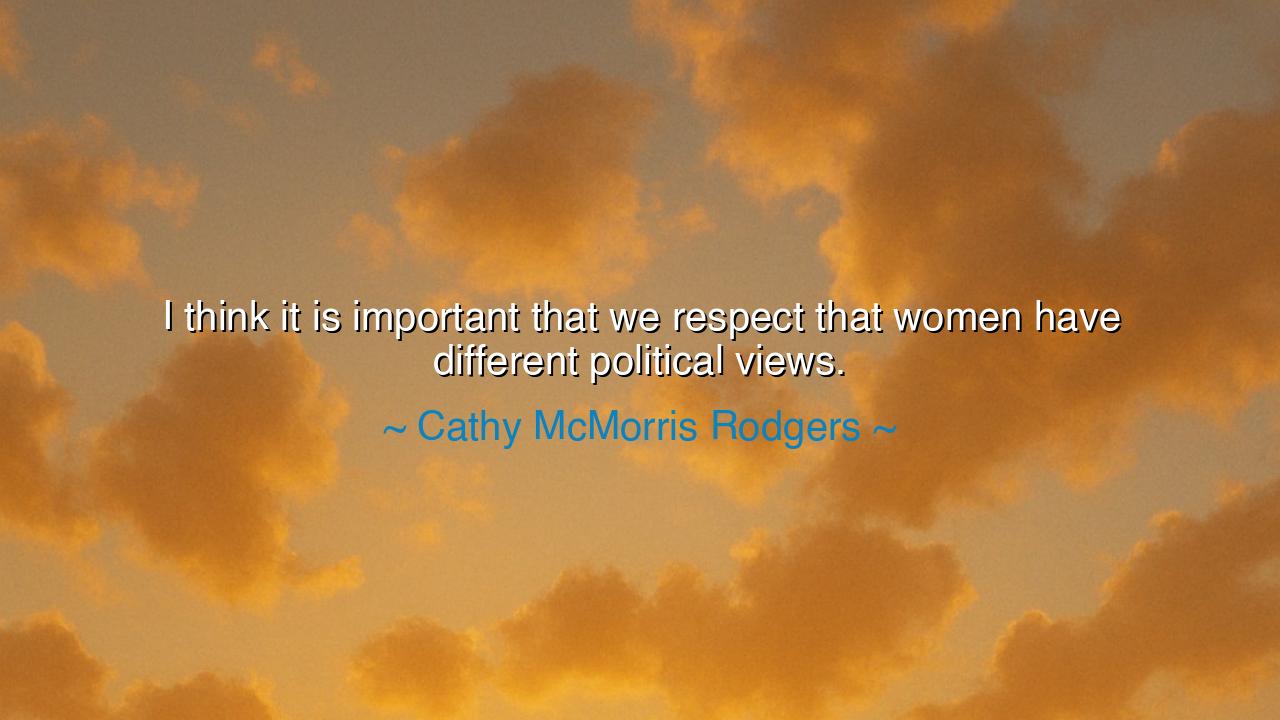
I think it is important that we respect that women have different






Hear, O children of reflection, the words of Cathy McMorris Rodgers, who spoke with steady voice: “I think it is important that we respect that women have different political views.” At first glance, these words appear simple, yet they carry the weight of centuries of struggle. For they affirm that women are not bound to a single thought, nor chained to one banner, but are free to choose, to believe, and to stand as full citizens in the realm of ideas. In this declaration we find the essence of liberty: that dignity is not only the right to speak, but the right to differ.
The meaning of her statement lies in its call for reverence toward diversity among women. Too often, society has sought to confine them to a single role, a single virtue, a single voice. But Rodgers insists that women, like men, bear within them a multitude of convictions. To respect these convictions, even when they clash with our own, is to honor womanhood not as a symbol, but as a living reality. Her words remind us that freedom of thought is not fractured by gender—it belongs to all who breathe.
The origin of this truth springs from the long path of history, where women once were silenced in politics, their voices dismissed as unfit for governance. Yet through generations of struggle, they claimed their place in the public square. From the suffragettes who endured prison and hunger strikes, to leaders who shattered barriers in parliaments and congresses, women proved that their views—whether radical or conservative, liberal or traditional—enrich the debate of nations. Rodgers, herself a leader in the halls of power, speaks from within this legacy, affirming that diversity among women is not weakness but strength.
Consider the story of Eleanor Roosevelt, who, though First Lady of the United States, did not confine herself to silence beside her husband. She spoke boldly for human rights, for the oppressed, for those forgotten by the state. Yet not all women of her age shared her convictions. Many opposed her vision, preferring a more traditional path. Still, Eleanor respected their freedom, for she knew that true progress is not measured by uniformity, but by the right of each person to stand by her beliefs. In her story, as in Rodgers’ words, we see that respect is the soil in which democracy grows.
The emotional strength of Rodgers’ declaration lies in its humility. She does not demand agreement, nor call for conformity. Instead, she lifts up the nobler challenge: to respect. For it is easy to honor those who mirror our own views, but it is wisdom to honor those who oppose us. This respect does not weaken conviction; rather, it tempers conviction with humanity. It is the recognition that beneath differences lies the shared dignity of the human spirit.
The lesson is profound: in your homes, your workplaces, your nations, learn to honor difference without hatred. If your sister, your neighbor, or your colleague holds a view unlike your own, listen before you rebuke. Debate without scorn. Remember that respect does not mean surrender, but recognition of the other’s worth. In this way, you strengthen not only your own soul, but the fabric of the community itself.
Therefore, let your actions flow from this wisdom. When you speak of politics, guard your tongue from contempt. When you hear the views of others, practice patience and courage, for it is in this exchange that truth is refined. And if you lead, as Rodgers led, remember always that the greatness of a nation lies not in one voice, but in many.
And so, carry forward this teaching: “Respect that women have different political views.” For in respecting their freedom, you uphold the very principle of democracy itself. In honoring their voices, you honor humanity. And in walking this path, you become not a divider of people, but a builder of peace.






AAdministratorAdministrator
Welcome, honored guests. Please leave a comment, we will respond soon